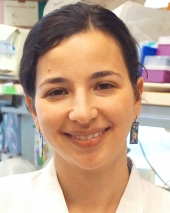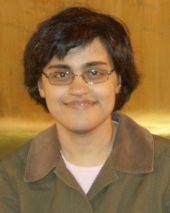Two UCSF Researchers Named 2017 Pew Scholars in the Biomedical Sciences
Two UC San Francisco scientists have been named Pew scholars in the biomedical sciences.
Anna Molofsky, MD, PhD, and Shaeri Mukherjee, PhD, were among the 22 early-career researchers in the 2017 class announced June 15 by The Pew Charitable Trusts.
The Pew Scholars Program in the Biomedical Sciences supports promising young investigators in science relevant to the advancement of human health. Each scholar receives four years of flexible funding to pursue foundational research.
“Pew is proud to support these investigators as they use novel approaches to illuminate the mechanisms of human biology and disease,” said Rebecca W. Rimel, president and CEO of The Pew Charitable Trusts. “This impressive group has demonstrated the curiosity and courage that drive great scientific advances, and we are excited to help them fulfill their potential.”

Molofsky is an assistant professor in the Department of Psychiatry, having completed both her residency and postdoctoral fellowship at UCSF. Her research focuses on brain development from the perspective of glia – specialized support cells that act as communication hubs between the immune system and the brain.
The brain generates thoughts and behaviors through connections between nerve cells. These connections, called synapses, are formed and removed in huge numbers during childhood and with learning. Previously, the Molofsky Lab discovered a key role for glia and the immune system in coordinating the important process of synapse remodeling.
Now, using molecular genetics, transcriptomics and imaging, Molofsky will set out to uncover how nerve cells communicate with two types of glia – astrocytes and microglia – to ensure the right number of synapses form during brain development. This work has the potential to uncover new treatments for diseases at the brain-immune interface, including autism spectrum disorder, schizophrenia and neurodegenerative diseases.

Mukherjee is an assistant professor in the Department of Microbiology and Immunology. Her research uses a suite of cutting-edge techniques in biochemistry, microbiology, cell biology and molecular genetics to explore the mechanisms that allow infectious bacteria to weaken host pathways and promote their own survival.
Host cells typically respond to microbial invasion by encapsulating a disease-causing agent, or pathogen, within a membranous compartment that fuses with a digestive cellular subunit to destroy the enemy. Yet some bacteria, including the one that causes Legionnaires’ disease, avoid this fate by directing the fusion of a different set of host membranes, generating a safe place to reproduce.
The Mukherjee Lab will determine how chemical modifications allow bacteria to manipulate and misdirect membrane trafficking in host cells, while identifying other host proteins that might be involved. This work ultimately may produce novel strategies for combating infection and new tools for investigating fundamental cellular processes.
The 2017 scholars join a thriving community of more than 900 biomedical scientists who have received awards from Pew since 1985.
Read more about the 2017 Pew Biomedical Scholars at the Pew Charitable Trust’s website.
For more campus news and resources, visit Pulse of UCSF